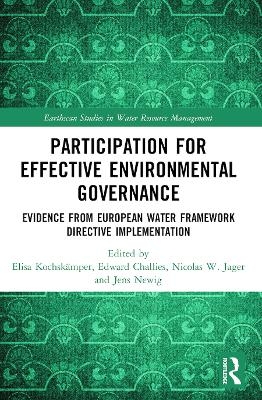
Participation for Effective Environmental Governance
Routledge (Verlag)
978-0-367-35236-3 (ISBN)
- Titel z.Zt. nicht lieferbar
- Versandkostenfrei innerhalb Deutschlands
- Auch auf Rechnung
- Verfügbarkeit in der Filiale vor Ort prüfen
- Artikel merken
Does participatory governance benefit the environment? The European Water Framework Directive (WFD), which came into force in 2000 with the aim of revolutionizing European water governance, mandates participatory river basin management planning across the European Union. The belief of European policymakers and the European Commission is that participation will deliver better policy outputs and implementation. This book examines a range of approaches to participatory river basin management planning, and considers whether and how participation impacted on the environmental standard of planning documents, quality of implementation, and social outcomes.
It draws on evidence from WFD implementation in eight case studies from Germany, Spain and the United Kingdom on the basis of a matched comparative case study design. The Directive sets common timeframes and procedural requirements, which provides a perfect test-bed and unique opportunity to study the effects of participation on implementation and outcomes in comparative perspective.
Elisa Kochskämper is a Research Associate with the Research Group on Governance, Participation and Sustainability at Leuphana University Lüneburg, Germany. Edward Challies is Senior Research Associate with the Research Group on Governance, Participation and Sustainability, at Leuphana University Lüneburg, Germany. Jens Newig holds a chair in governance and sustainability at Leuphana University Lüneburg, Germany, affiliated with the university's Faculty of Sustainability and its Center for the Study of Democracy. Nicolas W. Jager is a postdoctoral Research Associate in the Research Group on Governance, Participation and Sustainability, at Leuphana University Lüneburg, Germany.
Part I Concepts and research design 1. Researching participation in environmental governance through the implementation of the European Water Framework Directive 2. Concepts: How participation leads to effective environmental governance 3. Paired case research design and mixed-methods approach Part II Empirical case studies of participatory water governance 4. Stakeholder involvement for Water Framework Directive implementation in Germany: Three case studies from Bavaria, Lower Saxony and Schleswig-Holstein 5. Stakeholder and citizen involvement for Water Framework Directive implementation in Spain: Three case studies from Andalusia, Cantabria and Catalonia 6. Stakeholder engagement in Water Framework Directive planning in the United Kingdom: Two case studies from Northern Ireland and Scotland Part III Comparative Analysis and Conclusions 7. Impact of participation on sustainable water management planning: Comparative analysis of eight cases 8. Participation and Effective Environmental Governance: Causal mechanisms, and beyond
| Erscheinungsdatum | 25.05.2019 |
|---|---|
| Reihe/Serie | Earthscan Studies in Water Resource Management |
| Zusatzinfo | 39 Illustrations, black and white |
| Verlagsort | London |
| Sprache | englisch |
| Maße | 156 x 234 mm |
| Gewicht | 80 g |
| Themenwelt | Naturwissenschaften ► Biologie ► Ökologie / Naturschutz |
| Recht / Steuern ► Arbeits- / Sozialrecht ► Sozialrecht | |
| Recht / Steuern ► EU / Internationales Recht | |
| Technik ► Bauwesen | |
| Technik ► Umwelttechnik / Biotechnologie | |
| Wirtschaft ► Volkswirtschaftslehre | |
| ISBN-10 | 0-367-35236-2 / 0367352362 |
| ISBN-13 | 978-0-367-35236-3 / 9780367352363 |
| Zustand | Neuware |
| Haben Sie eine Frage zum Produkt? |
aus dem Bereich


